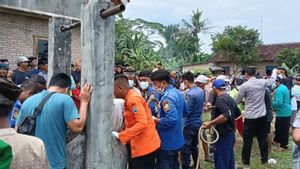JAKARTA - On March 20, 1940, Sapardi Djoko Darmono was born. Sapardi was born in Surakarta, Central Java. He also grew up in the city. Last year, July 2020, Sapardi died. Even so, he is still a writer. What he wrote kept him alive. Sapardi is immortal.
In Surakarta, Sapardi was not only born. He also grew up there, from elementary to high school, before finally Sapardi continued his studies at Gadjah Mada University (UGM). Sapardi's writing talent has been smelled since he was a teenager. At that age he was used to writing.
Sapardi even sent his writings to many magazines. This habit developed when Sapardi entered the Western Literature majoring in English. Before becoming a great poet, Sapardi was a teacher at IKIP Malang from 1964 to 1968.
Sapardi was also the Executive Director of the Indonesian Foundation, which published the Horison magazine in 1974. Then Sapardi returned to teaching. This time he served at the University of Indonesia (UI). At UI, Sapardi also served as Dean of the Faculty of Letters for the period 1995-1999.
Eternal because of writersSapardi is a writer. If Pramoedya Ananta Toer said, whoever writes, he is immortal. Sapardi passed away on Sunday, July 19, 2020 at Eka Hospital BSD, South Tangerang, Banten.
All connoisseurs of his work throughout the archipelago mourn the departure of a great figure for the development of literature in Indonesia. Let us quote Goenawan Mohamad when Sapardi celebrated his 77th birthday in 2017.
"Sapardi (is) celebrating his rebirth."
Because of that, Sapardi may have passed away. However, Sapardi's departure makes works seem to be reborn. Call it his poem entitled Rain in June (1994). Since the day of his death the poem has frequently filled various newsletters on social media.
"Nothing could be wiser. From the rain in July. Wiped off the trail of hesitating feet on the road."
The rhyme fragments of the June Rain prove that the lyrical, soulful yet simple poem is truly reborn. Those who have fallen in love with these poems many times are captivated again by Sapardi's poetry. No wonder, the poet Joko Pinurbo once said that Sapardi was like "one of the main apostles in the world of Indonesian poetry."
"The daily theme that Sapardi chooses is his strength. His works on rain, falling flowers, gutter water, shadows, rocks, and star fruit trees show how familiar he is with everyday situations that others often forget. "I consider people and things to be the same," said Sapardi. "Like a child, I consider an object as a friend," wrote Ninin Damayanti in her writing in Tempo Magazine entitled Penyair Hujan dari Baturono (2010).
Ninin added that Sapardi is not like the poet Chairil Anwar, who suddenly can be very surprising because he uses unusual sentence structures or strange words. Sapardi is Sapardi with his simple poetry.
The other side of SapardiMost people know Sapardi as a world star in the world of poetry. In fact, behind dozens of literary books - some of which are collections of poetry - such as Mata Pisau (1974), Paper Boat (1983), Magic Rain (1984), Rain Bulan Juni (1994), Arloji (1998), Verses of Fire ( 2000), to Mata Jendela (2002), Sapardi lives with other hobbies.
Some of them are wandering around and playing music, especially guitar. Bakdi Soemanto also recorded this description in the book Sapardi Djoko Damono: Work and His World (2006). According to him, Sapardi is a wandering person, like his father, Sadjoko. Thus, Ngadijayan Village and its surroundings, which was the place where Sapardi spent his childhood, was endlessly explored by Sapardi.
It is in this wandering activity that Sapardi makes the book rental place the place he most often stops for for a moment to read. Later, his wandering activities are arranged in two layers of meaning. The first layer wanders in a physical sense, by walking from one area to another.
“The second layer of wandering is the exploration of the mind through reading. Wandering about with this thought also seems to be accompanied by 'by the way' reading material. Because, this is how it is: reading is a dialogue activity. Reading (Sapardi) does not only passively absorb what is seen by the eye. However, also with considerations, "added Bakdi.
Interestingly, since Sapardi received higher education at the Faculty of Letters, Gadjah Mada University (UGM) majoring in English, his creative instincts have been honed. Sapardii often appears in programs such as poetry and discussions. Nevertheless, Sapardi was known as a reliable guitarist.
His ability to play guitar is quite good. At the same time, Sapardi often plays with his band at campus events. Because of his hobby, Sapardi seems unable to escape with his favorite guitar. Because of his hobby of playing guitar, one of his friends who is also a writer, Umar Kayam, said that Sapardi often brought his guitar to the office when he was still the Dean of the Faculty of Literature, University of Indonesia.
"Of the various artistic abilities that Sapardi possesses (dancing, beating the gamelan, playing guitar, leading a band, drawing, playing drama, and being a writer), it seems that only the field of literature stands out. He is not only known as a top poet in Indonesian territory, even abroad, ”added Bakdi.
Therefore, Sapardi is a complete package of literary forms that are actually recorded in the large historical dictionaries of the archipelago's famous poets. In the end, Sapardi's death indicated that his work was still immortal and resonates to this day.
* Read other information about LITERATURE or read other interesting writings from Detha Arya Tifada.
TODAY'S HISTORY OthersThe English, Chinese, Japanese, Arabic, and French versions are automatically generated by the AI. So there may still be inaccuracies in translating, please always see Indonesian as our main language. (system supported by DigitalSiber.id)









